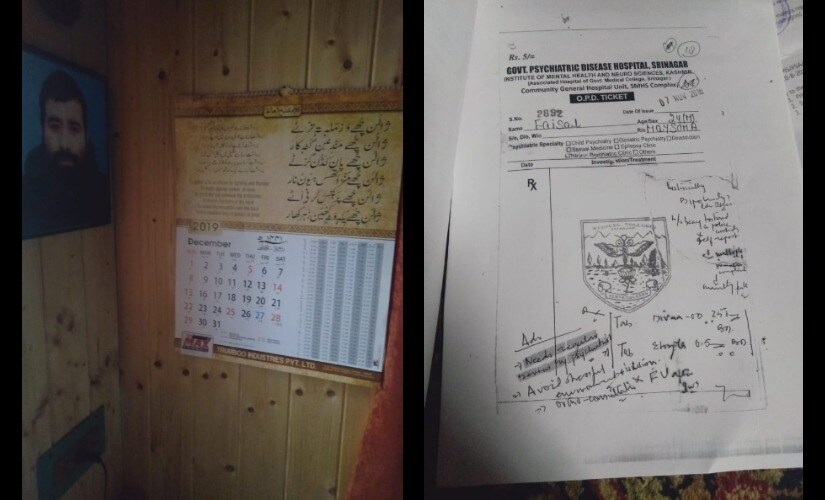In Srinagar’s Maisuma locality, 55-year-old Ateeqa Bano waits for news of her son. Ateeqa’s son, Faisal Aslam Mir, was arrested on 5 August 2019, after the central government abrogated Article 370, stripping Jammu & Kashmir of its special status and bifurcating the state into two union territories. Since then, Ateeqa has seen him barely a handful of times, and later learnt that Faisal is being held in a jail in Uttar Pradesh. Sitting on a prayer mat in the small kitchen of her house, Ateeqa indicates the wall, where a calendar and a framed photo of Faisal are fixed. “I have to remember the dates to know when to visit court, and the photo helps me feel closer to my son,” she says. Ateeqa’s husband passed away 15 years ago. Since then, she’s relied on her daughter, now married, and Faisal. From August onwards, Ateeqa has been alone in the family’s house in Maisuma. She narrates what happened on the day of Faisal’s arrest: Amid the lockdown in the state, Faisal had stepped out to visit the medical store. When CRPF personnel wouldn’t allow him to go to the shop, Faisal reacted angrily, and was detained under the Public Safety Act, like hundreds of other Kashmiris. [caption id=“attachment_7789981” align=“alignnone” width=“825”]  Ateeqa Bano looks through documents containing details of her son Faisal’s arrest. All photos courtesy the writer[/caption] Two of his friends who witnessed the incident rushed to Ateeqa’s home and told her what had transpired. “After my son argued [with the CRPF], he was taken away in a police jeep, but was it that big a sin?” she asks. On hearing of Faisal’s arrest, Ateeqa rushed outside the narrow lane of her neighbourhood. She saw the station house officer and asked him what her son had done wrong. “He [the officer] told me Faisal was innocent and promised that my son would be released by that evening,” recalls Ateeqa. Ateeqa kept an unwavering vigil by the window of her house as the hours passed. Sunset came and went, but there was no sign of Faisal. Still, Ateeqa waited, hoping that by the time the sun rose, at the very least, her son would be home. When he didn’t, Ateeqa made the rounds of the police station. She says she requested the police to release Faisal and forgive him for any mistakes he may have committed, but “they didn’t pay any heed”. Within three days of his arrest, Faisal was shifted to Central Jail, Srinagar. Ateeqa was caught unawares, finding out about the move only when she visited the Maisuma police station carrying food and juice for Faisal. Over the next two weeks, Ateeqa was allowed to meet Faisal only twice. “Hundreds of people were waiting for their turn to meet relatives in the jail,” she says. Then, on 26 August, on one of her visits to Central Jail, Ateeqa was told that Faisal had been moved once again — this time to a facility in Uttar Pradesh. Ateeqa — who doesn’t have the funds to travel to Uttar Pradesh — hasn’t seen her son since. “How would have I gone?” she asks. “I have nothing, and no one who could come with me.” In the first week of December, Faisal managed to get a message across to his mother: it was very cold in the prison; could she get him some warm clothes? “Who would I tell that I cannot go visit him, I don’t have the money,” Ateeqa says. [caption id=“attachment_7789991” align=“alignnone” width=“825”]  (L) A photo of Faisal and a calendar help Ateeqa feel close to her son and keep track of his court appearances; (R) Faisal’s medical certificates[/caption] This was not the first time Faisal had been incarcerated. In 2016, as a wave of protests swept the Valley in the wake of Hizbul Mujahideen commander Burhan Wani’s death, Faisal was arrested on charges of stone pelting. He spent two years in different jails under the Public Safety Act. Ateeqa struggled with court and police station visits then, although she adds: “I didn’t say my son was innocent at the time, but it was a mass protest”. Official documents misstated Faisal’s age as 29, and as 26 in other places, although according to his school certificate, he is 22. His PSA arrest report reads: “The subject is mentor of enforcing hartals, strikes and such other activities which hamper growth and development besides creating law and order situations [sic].” Ateeqa believes Faisal has been unfairly arrested now because of his activities in 2016, negating the turnaround he had effected in the months since his release. As the police had seemed apprehensive of releasing Faisal, Ateeqa promised officers in his presence that he would never again engage in stone pelting or other such activities. Faisal was determined to make a fresh start, Ateeqa says, and he started a clothing business. “He never wanted me to lose my respect. He had really changed,” she explains. People in the locality noticed the transformation too. Faisal’s work kept him busy and at other times, he was engaged in caring for his mother. Until 5 August 2019. Ateeqa now waits for another date, to visit the court again and fight for her son’s release. Like the calendar on the wall, and the photograph, she has another talisman: a bag containing all Faisal’s documents — from his medical certificates to his police reports. She pulls the papers out, showing them to visitors. “Till the time I am alive, I will fight for my son,” she says. “I know I am the only one he has left.”
Ateeqa Bano’s son, Faisal Aslam Mir, 22, was arrested on 5 August 2019, after the central government abrogated Article 370, stripping Jammu & Kashmir of its special status
Advertisement
End of Article


)

)
)
)
)
)
)
)
)



